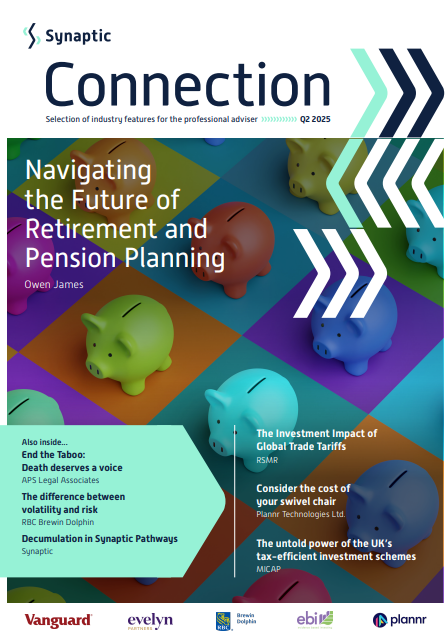In this edition...
- Navigating the Future of Retirement and Pension Planning: Key Insights for UK IFAs and Wealth Managers James Goad, Managing Director - Owen James
- Profit or Pitfall? The Investment Impact of Global Trade Tariffs Naeem Siddique, Investment Research Manager - RSMR
- Consider the cost of your swivel chair Abi Hortin, Marketing & Community Executive - Plannr Technologies Limited
- End the Taboo: Death deserves a voice Charlotte Merrills, Compliance & Associate Support Manager - APS Legal Associates
- From Calendar to Tolerance: Rethinking Portfolio Rebalancing Chris Johnston, MSc Data Analyst - ebi Portfolios
- The difference between volatility and risk Antony Champion, Managing Director - Head of Intermediaries - RBC Brewin Dolphin
- Billions in Innovation: The untold power of the UK’s tax-efficient investment schemes Prashant Trivedi, Investment Analyst - MICAP
- Decumulation in the Synaptic Pathways ecosystem Seb Marshall, Product Manager - Synaptic
- Market volatility is inevitable - Adviser’s Alpha® is enduring Warwick Bloore, Senior Specialist, Adviser Research Centre - Vanguard Europe
- Redefining Index Investment Strategies Dan Caps, Portfolio Manager - Evelyn Partners
- The FCA Protection Market study: What it means for intermediaries Kris Armstrong, Compliance Policy Manager - Simplybiz
 Death is a subject that nobody likes or even wants to talk about. Bringing up the subject and that you are planning for it, can often be met with worried or shocked faces from family and friends.
Death is a subject that nobody likes or even wants to talk about. Bringing up the subject and that you are planning for it, can often be met with worried or shocked faces from family and friends.
Have you seen the adverts on TV, where people are talking to their families regarding their funeral plan? Remember, the worry and shock on family faces!
Planning for death should not be a taboo subject, that we feel we cannot bring up with those closest to us and essentially those who need to know for when the time comes.
Why has death talk become taboo?
To us, it may seem that the Victorians were obsessed with death. The era saw the rise of suburban cemeteries, huge interest in funerals, mourning dress and mementoes of the dead. But in those days, death was part of everyday life. People’s average lifespan was roughly half what it is today, and most people died at home.
The situation could not be more different today, with people living far longer.
This may encourage you to think of death as something that will happen so far in the distant future that it isn’t worth contemplating. Older relatives may well die in homes and hospitals, and most people may have never seen a dead body.
Another factor that may make death unmentionable is the tendency among some doctors to see it as failure when all their efforts are dedicated to prolonging life. This idea is also seen in some of the language used when people die. For example, newspapers which might report that people have lost a ‘brave fight’ or ‘battle’ with their illness. Making death seem like a failure!
We have a long road ahead to change this stigma; but Covid-19 was a start to most people thinking differently.
As an industry we need to continue to educate clients on the importance of not only having Wills in place, but also discussing these matters with their families openly, so that when the time comes, they are fully aware of the discussions that were made, why these were made, where the important documents are kept, and what they need to do next. This will not only reduce issues at the probate stage but also reduce stress for the family.
Bereavement
This stigma doesn’t just apply to talking about and planning for death, but also when dealing with a bereavement.
Imagine, you are newly bereaved, whether that is a partner, family member, or friend. You could then be expected to organise a huge array of practical things at a time when you are not only grieving yourself, but you are also physically and emotionally exhausted.
The bereaved can be deprived in many ways, depending on the circumstances of the death and the relationship with the deceased. They may feel deprived of hope, the future, peace of mind, financial security and/or the chance to say goodbye or to put things right.
Remember grief is not something you “get over”, rather it becomes part of you, something that will become integrated into who you are and if someone is severely suffering with grief, they can be signed off work on sick leave and potentially classed as a vulnerable person.
More information?
There are loads of websites discussing why death is taboo and how as a generation we need to work together to change this. I have linked a couple of good ones below for you that also include links to further resources that can be used with clients:
• Help us break the taboo around death
• Dying Matters: The 'death taboo' - St Clare Hospice
Join APS Legal & fight this taboo together
At APS we understand that the same membership doesn’t work for everyone as we are all different and have different needs and priorities, so we currently offer three different types of membership:
Referrals
To be able to assist your clients with getting a will or Lasting power of attorney put in place without having to undertake the additional work yourself, we would just need your clients’ details and then one of our Estate Planning only associates (non-IFA) would be able to deal with this for you with you receiving a 15% referral fee on completion of the case.
Training Needed – None
Costs – None
Advantage – No fees, additional service to offer clients
Disadvantage – Not keeping all the clients work inhouse. Missing out on a bigger income stream.
Full Associate
This route gives you full control of advising your clients on all aspects for Wills, Lasting Powers of Attorney and Trusts. You would meet the client as you would as usual, advise them on their specific situation and take instructions from them; we then draft all documents in house, all of course which is covered under our PI insurance and who is better to advise your clients on their future finances than you.
Training Needed – 3 Day Training course, with examination
Costs – Monthly Associate fee of £85.00 p/m for the first 12 months, dropping to £40.00 p/m from month 13 onwards, documentation fees on each
Advantage – Full range of additional service to offer clients, enhances relationship for future engagement, increased income stream.
Probate Associate
This route enables you to offer Estate Administration services to your clients. You would meet the executors and advise them on the specific situation then take information from them on the estate; we provide a fixed quote, all of course which is covered under our PI insurance. You are essentially the client contact, and all the work is provided through APS Legal and our panel solicitors.
Training Needed – Two 45-minute webinars and multiple-choice test (can be done at any time, no need to wait for a course date)
Costs – £150.00 per year (Just one case a year would more than cover this fee)
Advantage – Additional service to offer Clients and opportunity to provide financial advice to the beneficiaries.
Get in touch:
aps-legal.com
01909 531751
enquiries@aps-legal.co.uk
Sign up for updates
Keep up to speed with everything you need to know each quarter, by email or post.


